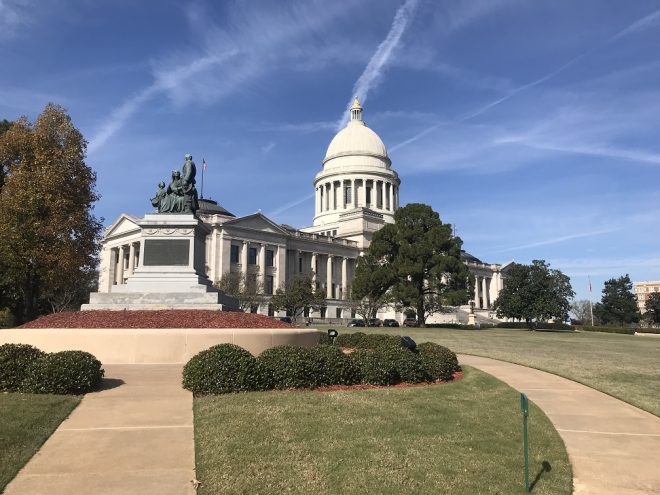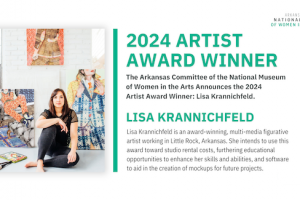PROVIDE & CONQUER: Arkansans for the Arts aims to empower creatives across multiple disciplines to advocate for the impact of their fields on the state’s economy

WORDS / KODY FORD
Often times, the arts are dismissed as leisure or whimsy, but the impact on our state is immense, whether it be tourism or place making or general economic benefits. In Arkansas, a group has emerged to combat that. Garbo Hearne of Little Rock, and Mitch Mitchell of Fayetteville, founded Arkansans for the Arts (ARftA) in 2014. The Arkansas Arts Council provided initial funding for ARftA. Arkansas was selected by Americans for the Arts in 2015 as one of ten states to participate in a three-year pilot project to promote and increase the availability of quality arts education. ARftA manages this project with funding from Americans for the Arts, the Windgate Charitable Foundation, and other donors.
According to ARftA board member Leonore Shoults,ARftA aims to educate business and civic leaders by empowering artists to speak for themselves on the importance of the arts in tangible terms for Arkansas and national arts initiatives and issues. Their main initiatives are to: provide data to substantiate the arts as a creative economy force in the state of Arkansas; support the Arkansas Legislative Arts Caucus; train ARftA members on effective arts advocacy methodology; provide connection to national and state legislators through use of VoterVoice, which is provided by Americans for the Arts when arts legislation occurs; build future art leaders through Students for the Arts in all eight districts on a college level; and protect arts education funding and provide a platform for “One Voice” for all disciplines in the state of Arkansas. It’s a tall order for a small organization, but one that plans to achieve its lofty goals by mobilizing an army of creatives.
Arts-related industries in Arkansas have had an economic impact of $2.7 billion and created 34,000 jobs, Shoults said. Creativity-reliant occupations add 14 percent to the economy according to preliminary research between AFftA and the Arkansas Economic Development Institute (AEDI). As good as those figures are, the job total doesn’t include part-time work, so it under-represents the total impact.
“The arts contribute directly to our economy through occupations, building a quality of place that attracts visitors and people wishing to relocate, and creating industries. Arts drive tourism and revenue to local businesses,” Shoults said. “They unify communities regardless of age, race, and ethnicity.”
One of ARftA’s goals is to create a strong database that encompasses all eight disciplines: Fine/Performing Arts (theater, music, dance, visual art), Building Arts (architecture), Culinary Arts (chefs, bartenders, food industry employees), Educational Arts (teachers and instructors), Film, Radio and TV (story creation and documentation), Museums and Collections, Graphic Design and Cosmetology (hair stylist, manicurist/pedicurist, masseuse, aestheticians). While some of these categories might seem obvious, others are often overlooked as creative fields.
State Sen. Joyce Elliott helped form the legislative caucus. ARftA introduced them during Arts Advocacy Day in November 2018.
“The beauty of this caucus is that its bipartisan and they are willing to acknowledge the arts are an economic base and impact the quality of life in Arkansas,” Shoults said. “They will be participating in arts town hall meetings in every district to communicate with their constituents as they develop their goals.”
Last November, ARftA hosted the inaugural Arts Advocacy Day at the State Capitol. More than 353 advocates came to voice support of the arts community as a leading job creator including patrons, organization leaders, and business owners. Sen. Elliott introduced the newly-formed Legislative Arts Caucus. Legislators visited 18 exhibitors and eight disciplines represented.
ARftA’s education committee organized an outstanding talent showcase which included more than 432 students and teachers from elementary, middle and high schools statewide. Their performances were the primary examples of arts education at work and how arts education continues developing creative thinkers of the future.
Arts Advocacy Day exemplified how eight arts disciplines integrate the workforce of four specific industries: health, education, agriculture, and tourism, Shoults said. The arts and culture are the third leading job creators for Arkansas generating revenue in every corner of the state. Arts education is the baseline for Arkansas’s creative economy.
While Arts Advocacy Day was a success, ARftA doesn’t plan to stop there. This fall they will host arts-focused Town Halls across the state in every district to educate participants about the creative economy, collect data and have an arts-based conversation with local state senators and representatives. The first meeting will be at 5 p.m. September 19 in District 8 at the Arts & Science Center for Southeast Arkansas in Pine Bluff. The next town hall meeting will take place in District 1 at noon on October 6 at the Walton Arts Center in Fayetteville. Their annual membership meeting will take place on October 27 at The Innovation Hub in North Little Rock.
“We are at a turning point in Arkansas,” Shoults said. “Industry realizes that they need quality-of-life to attract corporations and, in addition to our state’s natural beauty, the Arts are key. Businesses realize that they need creative problem solvers in their workforce and the Arts are key. We all need to find a way to come together across the bitter divides now facing our country, and the Arts are key. You don’t have to be an artist, your talent might be a different contribution but, we are all one voice—that’s the key.”
/ ARKANSANSFORTHEARTS.ORG

Previous Story
Crystal Bridges Museum of American Art Announces New Acquisitions of Works by Kehinde Wiley, Jordan Casteel, Henry Ossawa Tanner, and Works from the Gordon W. Bailey Collection



Comments